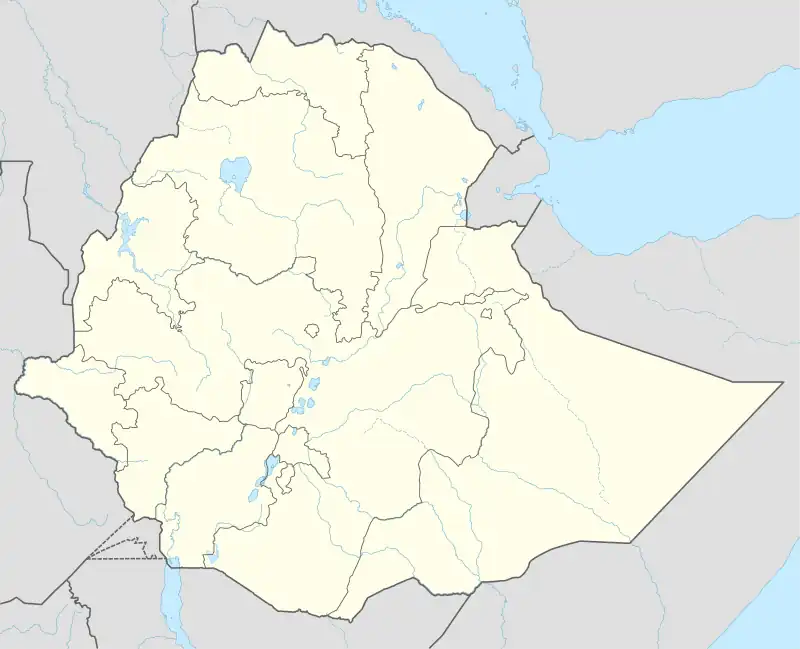Kurmuk | |
|---|---|
Town | |
 Kurmuk Location within Ethiopia | |
| Coordinates: 10°33′26″N 34°17′44″E / 10.557192°N 34.295485°E | |
| Country | Ethiopia |
| Region | Benishangul-Gumuz |
| Zone | Asosa Zone |
| Elevation | 653 m (2,142 ft) |
| Population (2005) | |
| • Total | 554 |
| Time zone | UTC+3 (EAT) |
Kurmuk (also known as Kumruk, Kormuk) is a town in western Ethiopia. Located in the Asosa Zone of the Benishangul-Gumuz Region, Kurmuk has a latitude and longitude of 10°33′26″N 34°17′44″E / 10.557192°N 34.295485°E with an elevation of 653 meters above sea level.
In 1962 Kurmuk was connected to Asosa by a dry weather road, "rough but passable by trucks" according to the Highway Authority.[1] However, by 1996 travel by this road was "discouraged for safety reasons."[2]
Based on figures from the Central Statistical Agency, in 2005 this town has an estimated total population of 554, of whom 297 were males and 257 were females.[3] According to the 1994 national census, its total population was 322, of whom 172 were males and 150 were females. It is the largest settlement in Kurmuk woreda.
The Italian colonial battalion garrisoned at Kurmuk attacked its twin in Sudan, Kurmuk, 7 July 1940, which was held by Bimbashi Mervyn Bell, with three British auxiliaries and 51 police. Bell eventually withdrew his men in good order, allowing the Italians to capture Kurmuk.[1] Kurmuk was taken from the Italians by the British several months later on 14 February 1941.[4] At the end of 1985, the Sudan Peoples Liberation Army (SPLA) set up bases in the hills across the Ethiopian border, south of Kurmuk .[1] The Ethiopian National Defense Force provided the SPLA with support when they launched a cross-border raid into Sudan in 1997.[5]
Notes
- 1 2 3 "Local History in Ethiopia" (pdf) The Nordic Africa Institute website (accessed 12 May 2021)
- ↑ "Benishangul-Gumuz, Situation Report, 10/96" Archived 2008-05-29 at the Wayback Machine (accessed 1 May 2008)
- ↑ CSA 2005 National Statistics Archived 2008-07-31 at the Wayback Machine, Table B.3
- ↑ Anthony Mockler, Haile Selassie's War (New York: Oliver Branch, 2003), p. 318
- ↑ David H. Shinn, "Ethiopia: Coping with Islamic Fundamentalism before and after September 11" (last accessed 10 December 2008)